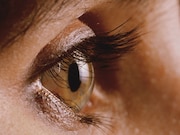Increases noted in total absolute looking time, number of fixations to eye region while viewing faces
WEDNESDAY, Jan. 23, 2019 (HealthDay News) — For patients with fragile X syndrome (FXS), mavoglurant treatment improves visual attention and pupil reactivity, according to a study published online Jan. 17 in PLOS ONE.
David Hessl, Ph.D., from the University of California Davis Medical Center in Sacramento, and colleagues used a previously validated eye tracking paradigm as a biobehavioral probe to assess social gaze behavior and sympathetic nervous system influence on pupil size in 57 adolescent or adult patients with FXS. Participants were assessed at baseline and after three months of blinded treatment with one of three doses of mavoglurant or placebo.
The researchers found that compared with patients with FXS treated with placebo, those treated with mavoglurant had increases relative to baseline in total absolute looking time and number of fixations to the eye region while viewing faces. Compared with placebo, after mavoglurant treatment, patients also had greater pupil reactivity to faces relative to baseline.
“It is our hope that these findings will help to guide future clinical trials by showing the potential for mGluR5 negative modulators to modify human behavior, and emphasizing the importance of syndrome-specific and physiological outcome measurement development for assessing target engagement, defining participant selection criteria, and helping determine what agents should best be explored in larger and longer trials with clinical outcomes for neurodevelopmental disorders,” the authors write.
Several authors disclosed financial ties to Novartis, which manufactures mavoglurant and funded the study.
Copyright © 2019 HealthDay. All rights reserved.








